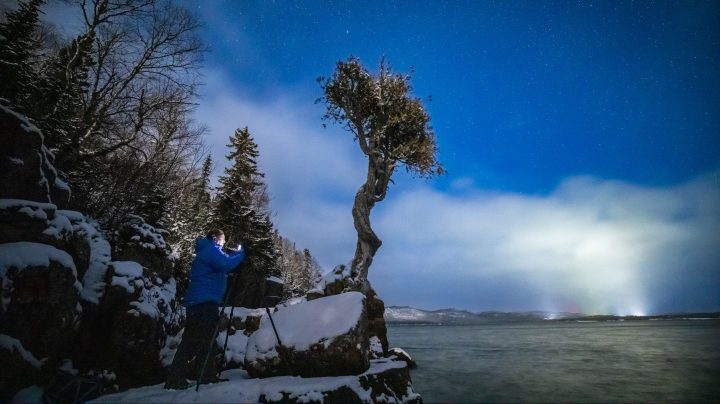
In an ever-brighter world, tourists travel north for truly dark skies
In an ever-brighter world, tourists travel north for truly dark skies

On the reservation of the Grand Portage Band of Lake Superior Chippewa, at the northeast tip of Minnesota, Travis Novitsky likes to walk to a place where a gnarled, centuries-old tree seems to grow straight out of the rock.
It’s known as Manido Gizhigans, “which is Ojibwe for ‘Little Spirit Cedar Tree,’” Novitsky explained.
It’s a sacred place, where visitors must be accompanied by a Grand Portage tribal member.
“It’s a great spot just to sit and take in what’s going on around you,” Novitsky says, and one of his favorite places to pursue his passion — photographing the night sky.
It’s only about 7 p.m., but it’s already intensely dark as Novitsky sets up his tripod and camera. Every few moments, the moon and a blanket of stars emerge from behind fleeting clouds.
“Sitting on the shoreline of a lake, seeing the stars reflected in the water, is an experience unlike anything else,” Novitsky says.
“Throughout day-to-day life, which can be pretty hectic sometimes, it can be hard to kind of quiet your mind,” he continues. “And coming out to these places, whether I’m taking photos or not, is just that way for me to kind of slow down, take a breath, just be in that moment and appreciate it. You know, just you and the sky, you and the stars.”
Increasingly, more people are venturing to remote, dark places like this to share in that experience.
Five years ago, tourism officials here published an online map of good spots to view the northern lights. They launched a Dark Sky Festival in early December, during the darkest time of year. Lodges offer stargazer packages at more than $200 a night.
Tourism marketer Kjersti Vick with Visit Cook County said she first realized the appeal of the region’s night skies when she was sitting around a campfire with out-of-town friends. All of a sudden it got really quiet.
“They were all just staring at the sky,” Vick recalled. “And they’re like, ‘Are there always this many stars in the sky?’ And it was kind of eye-opening for me, for somebody who grew up in this area and always saw this many stars in the sky, that not everybody gets to experience this.”
Scientists estimate that 99% of the continental U.S. and Europe now suffers from some kind of light pollution. Nearly 80% of North Americans can’t see the Milky Way where they live.
As the world has become brighter, dark sky tourism has grown.
Valerie Stimac Bailey, author of the Lonely Planet book “Dark Skies: A Practical Guide to Astrotourism,” said it’s hard to quantify that growth, but it was clearly boosted by the pandemic.
Photographer Travis Novitsky sees that increased interest firsthand along the Lake Superior shoreline. There are nights when he’ll pull up to a favorite spot that he used to have all to himself. Now, there might be another half-dozen cars around.
He struggles with that. He knows that some of those people are probably there because of him and the photographs of the night sky and the northern lights he’s taken over the years.
“The more people that come to experience that makes it harder to continue to get the same experiences that I’m used to and why I love it.”
While it can be frustrating to lose that solitude, he said, it’s also rewarding to share these spaces with other people.
“Because I know that those folks are there because they want to experience a piece of what I experience — that amazement, that wonder and that appreciation.”
There’s a lot happening in the world. Through it all, Marketplace is here for you.
You rely on Marketplace to break down the world’s events and tell you how it affects you in a fact-based, approachable way. We rely on your financial support to keep making that possible.
Your donation today powers the independent journalism that you rely on. For just $5/month, you can help sustain Marketplace so we can keep reporting on the things that matter to you.

















